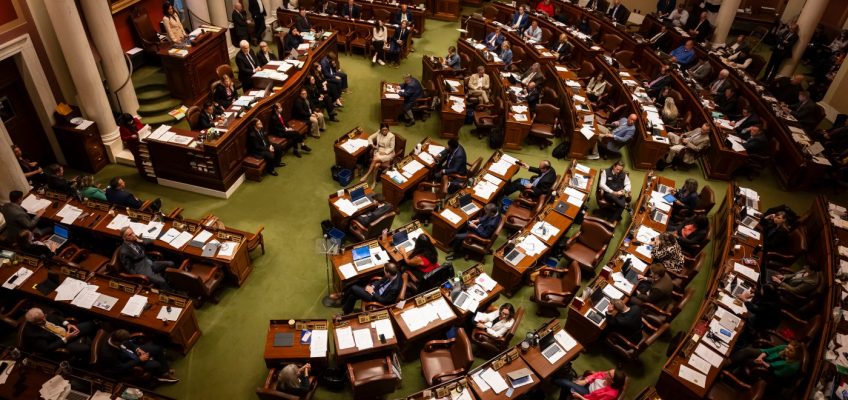Democratic lawmakers are proposing legislation to allow individuals to sue federal immigration enforcement agents for unconstitutional damage or other harm they suffer under abuse of power.
The bill comes from concerns — particularly in the Twin Cities — over the constitutionality of federal agents’ treatment of Minnesotans during the immigration enforcement action that began in January.
Legislation authored by House DFL Leader Rep. Jamie Long, DFL-Minneapolis, which came before the House Judiciary Finance and Civil Law Committee this week would essentially allow individuals to sue law enforcement officers for violating their U.S. or state constitutional rights.
Long stressed the need for the bill, noting that “many constitutional violations by federal actors fall through the cracks and don’t lead to accountability.” He noted that the bill would mirror legislation that has been in place for local and state actors since 1874, expanding it to include federal actors.
Committee Co-Chair Rep. Tina Liebling, DFL-Rochester, expressed concerns about the lack of outrage over the issue.
“It just strikes me that here we are sitting quietly in this conference room, in this committee, and hearing the words about what’s happening … it’s absolutely chilling. And hearing you all talk about it in these calm, quiet words, there’s almost a disconnect there,” she said. “Because this is the core of our country. This is what we all depend on, this is what we call America, is that we have these rights. And the violation of them is just absolutely stunning.”
Republicans expressed concerns over the bill’s requirements — for example, that it would allow individuals to sue government officials up to six years after the violation occurred.
Rep. Peggy Scott, R-Andover, proposed an amendment to the six-year lookback allowed in the bill, but it failed to pass.
“I hesitate to go down this road of making law that’s retroactive in nature,” she said.
Liebling countered: “The unreliable, unprecedented violation of civil rights in this state over the last few months, to not have this be retroactive, to me would be a travesty.”
Related Articles
Columbia student arrested by ICE agents who claimed to be seeking ‘missing person,’ lawyers say
Trump administration asks the Supreme Court to allow an end to legal protections for Syrian migrants
Human smuggling case against Kilmar Abrego Garcia ‘just kept getting stronger,’ agent testifies
Dining Diary: Thai food, tacos and tipples, oh my!
St. Paul City Council expands rent aid program
Scott also shared concerns that there would be constitutional cases against the law, claiming that it violates the Supremacy Clause, which allows federal law to take precedence over state laws if they are in conflict.
“One of the things that your members were talking about is that we want to avoid situations where there are going to be constitutional challenges because it’s expensive for the taxpayer,” she said.
Long emphasized his efforts to ensure that the bill is constitutional, noting that it would apply equally to all actors, not just immigration enforcement, as some states have done.
Related Articles
Columbia student arrested by ICE agents who claimed to be seeking ‘missing person,’ lawyers say
Trump administration asks the Supreme Court to allow an end to legal protections for Syrian migrants
Human smuggling case against Kilmar Abrego Garcia ‘just kept getting stronger,’ agent testifies
Dining Diary: Thai food, tacos and tipples, oh my!
St. Paul City Council expands rent aid program




